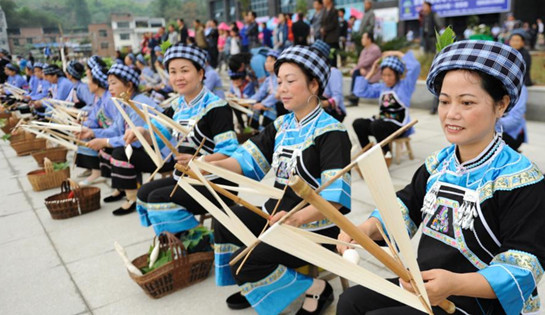Home>Culture
Folk custom
(chinadaily.com.cn) Updated: 2016-09-13
Miao Aug 8 Festival in Xingren
This traditional festival is based on a folk legend which has it that, in ancient times, there was heavy rain that lasted for 100 days and their villages were flooded and people and animals suffered a lot. Then, one brave boy, A Yi, and a beautiful, kindhearted girl, A Lan, put themselves in a large wooden basin with their loyal dog, A Ga, and floated freely on the water, not fearing for their lives, and later started a new life by cultivating rice and vegetables. And, on harvest day, Aug 8 of the lunar calendar, they married and had children, creating a hardworking, brave, wise civilization. So, for generations, each Aug 8 of the lunar calendar, Miao families have laid a table of good alcohol and food to pay tribute to the dog for bringing rice grains to the Miao. They provide one bowl of glutinous rice for the dog then consume it themselves. They also dance and sing to celebrate the harvest and a beautiful life. 'Aug 8' is also called the 'New Attempt Festiva' by the Miao, where they take grain, chickens, ducks and traditional food to the old and the young, relatives and friends. And they sing and dance, talk about old and current times and wish one another all the best then eat a reunion meal to share the joy of the harvest.
Bouyei Religious Culture
The religious beliefs of the Bouyei in Qianxinan involve gods and ghosts, with various sacrificial ceremonies, for example for the tree god in relation to birth, the water god for production, the kitchen god for cleansing and safety, the ancestors for general worship, and a death ceremony for the soul. Many of these ceremonies are listed as national or provincial cultural heritage.
The folk custom at the national level include the Zhabai Singing Festival, the 12 Keys of the Copper Drum, the Lion Dance, 'March 3', and Bouyei Drama, while those at the provincial level include a Bronze Drum Performance, Bouyei Drama, wedding music, 'June 6', the 12 Ancient Songs, the Transition Dance, and the Copper Drum custom.

Miao Embroidery Festival
Each Jan 8 of the lunar calendar, the Miao adorn themselves in grand attire for some singing and dancing to celebrate the ‘Embroidery Festival’, where thousands of people from different ethnic groups also come to take part and pray for a bountiful harvest and peaceful year.
Bouyei Zhabai Singing Festival
The festival takes place each June 21 - 23 of the lunar calendar, with young people putting on their finest attire and getting together to sing and dance, show their love and their desire for a happy life. This is now referred to as the Bouyei 'Valentine's Day' and was put on the national heritage protection list in 2006.
June 6th
June 6 is also referred to as 'Seedling Tribute' or 'Tribute to Young Crops' and 'Grain God Tribute' and is based on a legend about how the Grain God is evolved. Each June 6 on the lunar calendar, the Bouyei gathered in their villages for an antiphonal singing contest and other folk activities to give them an opportunity to make friends. This is on the provincial cultural heritage list.
Yi Maiden Dancing without Musical Accompaniment
This Yi ethnic group dance comes from daily life of these people and involves various acts. Most of the dance performances are related to farming, such as planting seedlings, driving the ducks, or feeding dogs. The girls also use it to express their love for a person and they convey their feelings through 12 dance steps, to show how a married girl can be diligent, thrifty, respectful of the elderly, and loving so she can make her family prosperous and bring it a happy life.
